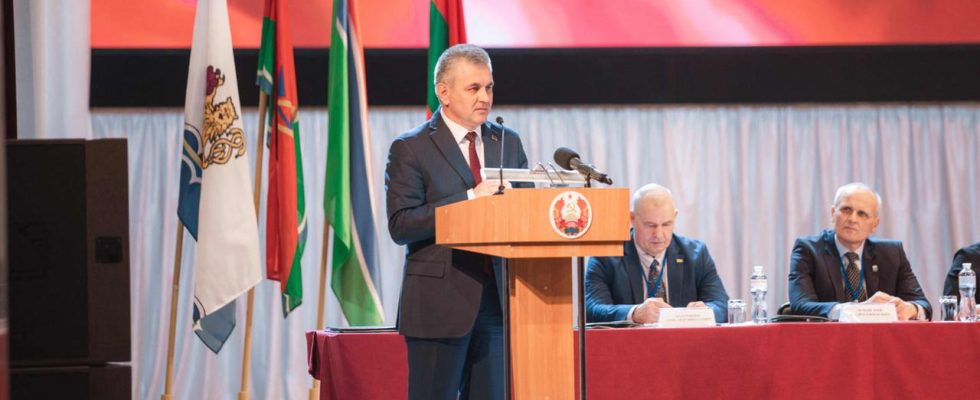interview
According to Eastern Europe expert Douglas, Russia is currently not planning to annex Transnistria. She sees the breakaway republic’s call for help to Moscow as a reaction to recent steps by the Republic of Moldova.
tagesschau24: The news made political observers sit up and take notice: Transnistria, which had broken away from the Republic of Moldova, had asked Russia for protection. What does that mean? What protection is meant?
Nadia Douglas: This is not the first time that Transnistria is asking for protection. In the past two years, especially since the start of Russia’s war of aggression against Ukraine, the de facto regime has repeatedly turned to its international partners in the 5+2 format. This is the format for resolving the Transnistrian conflict, with repeated appeals to maintain security and peace guarantees for the region.
In fact, Transnistria is feeling under pressure, especially since the Republic of Moldova started on its path towards EU membership. Since the 5+2 format for conflict resolution was de facto suspended, there has been increasing open talk in the Republic of Moldova itself about a possible reintegration of Transnistria. It’s no longer so much about concessions that should be made to the region. Last year, a separatist law was passed that criminalized so-called separatist efforts for the first time.
A new customs regime was introduced at the beginning of the year, causing difficulties for Transnistrian entrepreneurs. This caused enormous outrage. Overall, I would be careful to compare yesterday’s congress and the symbolism, which is clearly also controlled by Russia, 1:1 and to draw parallels with the situation in Donbas at the beginning of 2022.
“Doubt there will be annexation”
tagesschau24: On the other hand, Vladimir Putin did not say a word about Transnistria in his state of the nation speech. How should you evaluate that?
Douglas: I think that Transnistria did not make these decisions independently, without consulting Russia. But I also think that it is still a symbolism and a way of the Transnistrian regime to put pressure on Moldova. And of course with the support of Russia. But I doubt that annexation will now take place or that there will be a threat of war against the Republic of Moldova. So I wasn’t surprised that President Putin didn’t mention Transnistria.
To person
Dr. Nadja Douglas is a research assistant at the Center for Eastern European and International Studies in Berlin. There she conducts research, among other things, on trust building and conflict resolution in Transnistria.
“Russia is more than involved in Ukraine”
tagesschau24: Would intervention in Transnistria even be justified economically and militarily?
Douglas: In the past, Russia has repeatedly justified all sorts of things. I have to honestly say that I, too, have often been wrong in my assessments of Russian intentions in the past. But I would consider it very unlikely, because Russia is more than involved in Ukraine. There is no economic reason for this. Transnistria is an item in the Russian state budget, because the de facto regime is maintained by Russia paying pensions there, and the costs of gas deliveries are essentially borne by Russia.
Strategically, things may look different. At the beginning of the Ukrainian war, an investigative portal in Moldova made it known that there were initially plans from the Kremlin to open a second front in western Ukraine, but these were then rejected. I cannot imagine that these strategic considerations will become relevant again now. The idea at the time was to create a land bridge to Transnistria via Odessa. But we’re not at that point right now.
tagesschau24: That is also the fear of many Western observers.
Douglas: This is a fear that has always been in the air over the past two years. But at the moment Russia does not share a border with Transnistria. So the situation there looks different than, for example, in Donbas at the beginning of 2022. That’s why I can’t imagine that at the moment.
“Orientation towards Russia is still very strong”
tagesschau24: Why have the separatists spoken out now?
Douglas: There is currently a feeling that the customs system introduced in January this year was the last straw. You also have to see: Transnistria is in a very tricky situation. It is sandwiched between Moldova and Ukraine, both of which are seeking EU membership. This is unthinkable for this region, where most of the population is culturally oriented towards Russia.
90 percent of the Transnistrian population now has Moldovan citizenship. But the orientation towards Russia is still very strong and despite everything, Russia is still seen as a protective power. Hence this appeal to Russia.
But in contrast to the constituent republics in Ukraine or the de facto regimes in South Ossetia and Abkhazia, Transnistria has behaved rather neutrally since the beginning of the Russian war of aggression in Ukraine. And I believe that the Transnistrian elites and the de facto regime there no longer see Russia as such a reliable and easy-to-assess partner.
The interview was conducted by Kirsten Gerhard, tagesschau24

